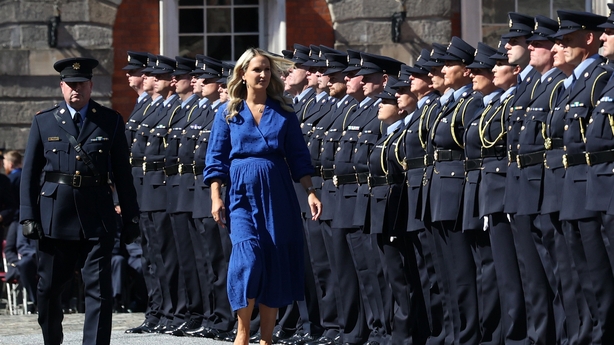The Government has announced an additional €10 million in funding for garda overtime in Dublin.
The Minister for Justice said the money will be made available immediately to put more gardaí on the beat in the capital.
The Garda Representative Association (GRA) welcomed the announcement but said the overtime is being offered because there is not enough gardaí to police the streets.
It comes as 87 new gardaí will graduate from the Garda College in Templemore today, with almost another 180 to begin training there on Monday.
Minister Helen McEntee said if momentum is maintained the Government is on track to have 800 new recruits this year.

However, this is 200 fewer than promised in the last budget, which means targets for garda recruitment will be missed for a second consecutive year.
Minister McEntee announced she has secured a new funding package of up to €10 million, specifically targeted at increasing garda visibility in Dublin.
The minister said the money will provide for 240,000 extra garda hours, or 20,000 extra garda shifts, putting more gardaí on the streets in the capital until the end of year.
She also said there will be an increase in gardaí on the streets in the next few weeks.
Ms McEntee said she accepts that garda recruitment is not where the Government wants it to be and she wishes they were further ahead.
She described the decision by the GRA to hold a no-confidence in Garda Commissioner Drew Harris as unhelpful.
Ms McEntee said the GRA had raised concerns but the most important thing was that there be dialogue and the parties sit around the table.
She said Mr Harris is always willing to engage and listen and she said that dialogue was the way forward and it was really important that both sides sit around a table.
The Minister said she was not sure what a no-confidence vote in the Commissioner would resolve.
The Deputy Garda Commissioner said she was not going to comment on the no-confidence motion but said there were supports in place within An Garda Siochana for members who have issues with morale.
Ann Marie McMahon also said the numbers were growing within the gardaí and while maybe not as fast as they would like, they were in a better place than it was in 2017.
The GRA, which represents almost 12,000 rank-and-file gardaí, has welcomed the announcement but said it shows the Government knows there are not enough gardaí and is now trying to fill the gaps with overtime.
GRA President Brendan O'Connor said gardaí's existing overtime allocation cannot be filled because members are fatigued and burned out, and the appetite among them for additional hours is very limited.
In the wake of the ongoing public concerns over the prevalance of violence in Dublin city centre, Minister McEntee also said the new Community Safety Partnership for the north inner city, which brings together a range of agencies, groups and organisations to improve safety, will publish its Community Safety Plan in the coming weeks.
'Sticking plaster'
Speaking on RTÉ's Morning Ireland, Social Democrats TD Róisín Shortall said recruitment difficulties within An Garda Síochána have not been tackled, in addition to "cultural problems".
"Ten million is all very well," Ms Shortall said.
"But up to a couple of days ago, the Minister for Justice (Helen McEntee) was denying that there was any serious problem in Dublin city centre.
"Additional policing is very important. But this sounds very much like a sticking plaster.
"We need consistent, adequate policing within Dublin city centre. But we also need a whole lot of other things to be addressed.
"The appalling level of dereliction that exists within the city centre, the state of the city centre is just shocking in many parts of it.
"And then there's also all of the issues about poor council services … street sweeping, cleansing. All of those issues."
She added that there is also a "huge problem with anti-social activity and drug addiction in the city centre, and there's a lack of services available locally in relation to that".
"We need to have a living city and we need to have a city that’s pleasant for Dubliners and other people to go to, to come to and spend time in," Ms Shortall said.
"And it's very far from that at the moment."




